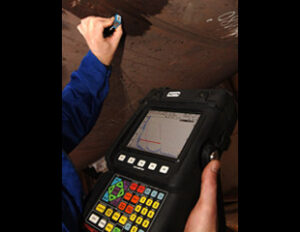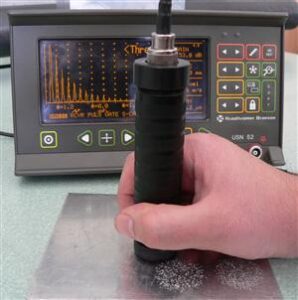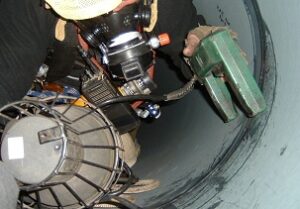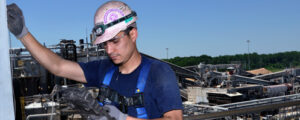Non Destructive Testing (NDT Services)
Ontario Tank SpecialistsNon-destructive testing embodies many different technologies. Each of these technologies is designed to seek out surface and/or sub-surface flaws. Whether it is for system design, upgrades, equipment reliability, or working with TSSA for CRN approvals, our engineers have both the skills and field experience to assure clients meet & exceed all engineering goals.
All our technicans are fully certified
Field and Shop Services
Field Services:
- Full service in all non-destructive testing methods
- API 510 and CWB W178.2
- Boiler and Pressure Vessel Integrity Studies
- Third Party Inspection
- Field repairs and system upgrades
- CRN Application and Engineering
- Insurance Inspections and Loss Prevention
- Property Loss Prevention Surveys
Shop Services:
- Eddy Current Inspection
- Ultrasonic Inspection
- Radiography
- Can process parts up to 40 feet in length for liquid penetrant inspection
- Can process parts up to 85 inches on a wet bench for magnetic particle inspection
- Registered to ISO 9001 / AS9100B
- Registered to NADCAP
- Registered to Transport Canada AMO 24-90
Dye Penetrant Inspection
Dye penetrant inspection is a means of locating fine cracks on the surface of parts and equipment. This process allows a visible or flourescent dye to accumulate any discontinuity to reveal its shape and location. This technique can be applied to virtually any non-porous material.
Dye Penetrant Applications:
- Welds
- Castings
- Forgings
- Turbine Housings
- Airplane Parts
- Many Non-Ferrous Metallic Materials
Magnetic Particle Inspection
Magnetic particle testing uses electrically induced magnetic fields to detect flux leakage at the site. This process is primarily used for surface and sub-surface defects.
Magnetic Particle Inspection Applications:
- Preventative maintenance
- Corrosion Surveys
- On Stream Inspection
- In Process Inspection
- In-Service Fatigue Testing
Ultrasonic Inspection
Ultrasonic Inspection involves the transmission of ultra-high frequency sound waves through the part being tested. It is useful for detection sub-surface discontinuities, dimensional measurements (thickness) and analyzing material structure.
Ultrasonic Inspection Applications:
- Structural Welds
- Ship Hull Thickness
- Corrosion Surveys
- Weld Quality
- Aircraft Wing and Tail Attachments
- Wheel Rim and Bead Seat Areas
- Gears and Shafts
- Forgings
- Some Castings

Eddy Current Inspection
Eddy current testing is an electromagnetic technique used on conductive materials to detect a number of conditions, including: sub-surface defects, variations in material structure, thickness and corrosion.
Eddy Current Inspection Applications:
- Crack Detection
- Non-conuctive measurement
- Heat exchanger tube examinations
- Thickness measurements of thin materials
- Corrosion thinning
- Conductivity measurements
- Verification of heattreatment
- Boiler tube assessment
- Condensers
- Remote Field Testing (Ferromagnetic materials)
- Tank Inspections
- Thickness of plating or cladding
Radiography Inspection
Sub-surface discontinuities are detected by transmitting x-rays or Gamma rays through a material to a film on the opposite side of the piece being tested. Radiography works on both ferrous and non-ferrous materials.
Radiography Inspection Applications:
- Aircraft Structures and Coomponents
- Welded Assemblies
- Pressure Vessels and Piping
- Electronic Circuitry
- Bridge Grinders
- Similar Materials
Gamma Ray Applications:
- Pipelines
- Bridge and Building Fabrications
- Pressure Vessels
- Large Forgings and Castings
- Armored Vehicle Components

Other Non-Destructive Testing Methods Available:
- IRIS Tube Scanning
- Infrared Inspection
- On-Site Meallurgy
- Video probe and Borescope Inspection
- Floor Scanner
- Acoustic Emission
Did you know?
Ontario Tank Specialists has a perfect safety record.
There has never been a loss time accident due to our comprehensive safety programs.
Ontario Tank Specialists
Have a question? Request pricing now! Please contact us to learn more...


